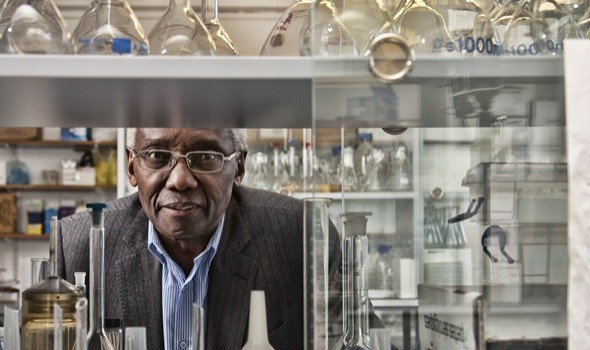Putting ourselves in the picture: Sir Geoff Palmer
Putting ourselves in the picture: Sir Geoff Palmer

Migrants have really put themselves in the picture in Scotland: an exhibition of photographs by and about migrants at a Glasgow museum has attracted more than an estimated 150,000 visitors.
The 60 portraits at the Kelvingrove Museum and Art Gallery are vivid proof of the many ways that migrants contribute to Scottish life.
They also help ensure that migrant heritage is documented and recognised as part of Scotland’s past and present.
Migration is not a one-way movement: a previous government estimated the worldwide Scottish diaspora (emigrants and their descendants) at between 28 and 40 million.
Sir Geoff Palmer, the first black professor in Scotland, who is featured in the exhibition, has pointed out that “three-quarters of the surnames in the Jamaican telephone book are Scottish, so many Jamaicans have some Scottish blood or history in them, whether they like it or not.
“So as I tell many Scots, your ancestors were not in Jamaica doing missionary service alone!”
At the opening of the Kelvingrove show he also pointed out that a Jamaica Street has existed in Glasgow since 1763: “So when we talk about “our city”, [if] we look back far enough, a lot of people have contributed.”
The two-way traffic is also illustrated by another person featured in the exhibition, Louise Falconer, principal policy officer at Glasgow City Council: her Edinburgh parents migrated to Australia before she was born, but after deciding to work overseas for a while, she responded to an advertisement for a post in South Lanarkshire in 2005, married, and stayed.
As Professor Alison Phipps of the University of Glasgow commented at the exhibition opening: “Glasgow is a UNESCO City of Music, and sometimes that music is the sound of a shutter clicking.
* Putting Ourselves in The Picture, runs at the Kelvingrove Museum and Art Gallery in Glasgow until September. It is part of a wider Migrant Voice project funded by the National Lottery Heritage Fund.
____________________________________________________________________________________________________________________________________________________________________________________________
Sir Geoff Palmer:
In 1948 I was told that my mother was going to London and I was to live with my aunts. When I was 14, my mother sent for me. My aunts got my passport, a ticket, a suit, and a small suitcase, which I still have.
Before I left, my grandaunt wrapped me in newspapers because she said London was cold. That the trip by plane and ship took nearly two weeks was not considered by her...
The day after I arrived in London, my mother woke me early and told me to get ready. As we were leaving, a man at the door asked where she was taking me, and she said, “To work”. The man told her, “You can go to work, but he can’t, because he’s not 15.” I had to go to school. I was 14 years and 11 months: one month changed my life.
My mother was upset because she had found me a job in a grocery shop. It had cost her £86 to bring me to London and it took her seven years to save that money.
Later I got a job as a junior technician at Queen Elizabeth’s College in London. One day Prof Chapman called me into his office and said, “I don’t think you’re as stupid as you try to make out. I think you should go to university.” So I went to Leicester University to do a botany degree.
I’ve learnt that no matter how able you are, it is the people you meet that determine what you achieve in the end.
What people need is a cup of kindness. When somebody asks you to take a drink with them, that is an act of kindness. How many migrants have been asked to join in such a drink?
If somebody is not prepared to eat or drink with you, you’re not part of the system. You get that relationship of kindness in a society if somebody sees you as equal.
I retired in 2005 as professor of grain science in the International Centre for Brewing and Distilling at Heriot Watt University. I am proud that many of my students have made successful careers in the malting, brewing and distilling industries worldwide.
I still do experiments at home in my kitchen! However, I now spend most of my time on the boards of various charitable organisations and give lectures to the community on Scottish/Jamaican/Caribbean history. This history is outlined in my book, The Enlightenment Abolished.
Photo credit: Karen Gordon


